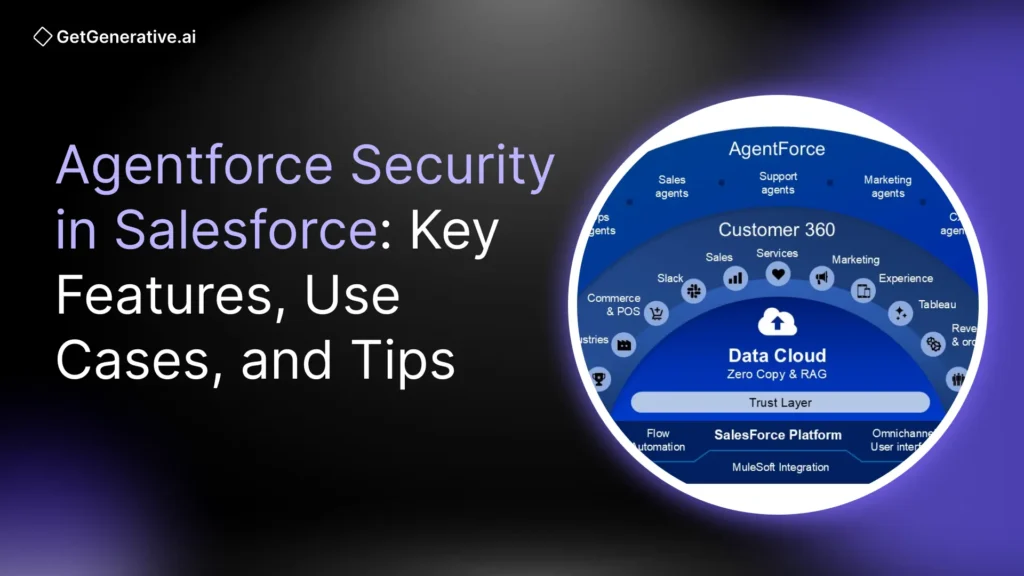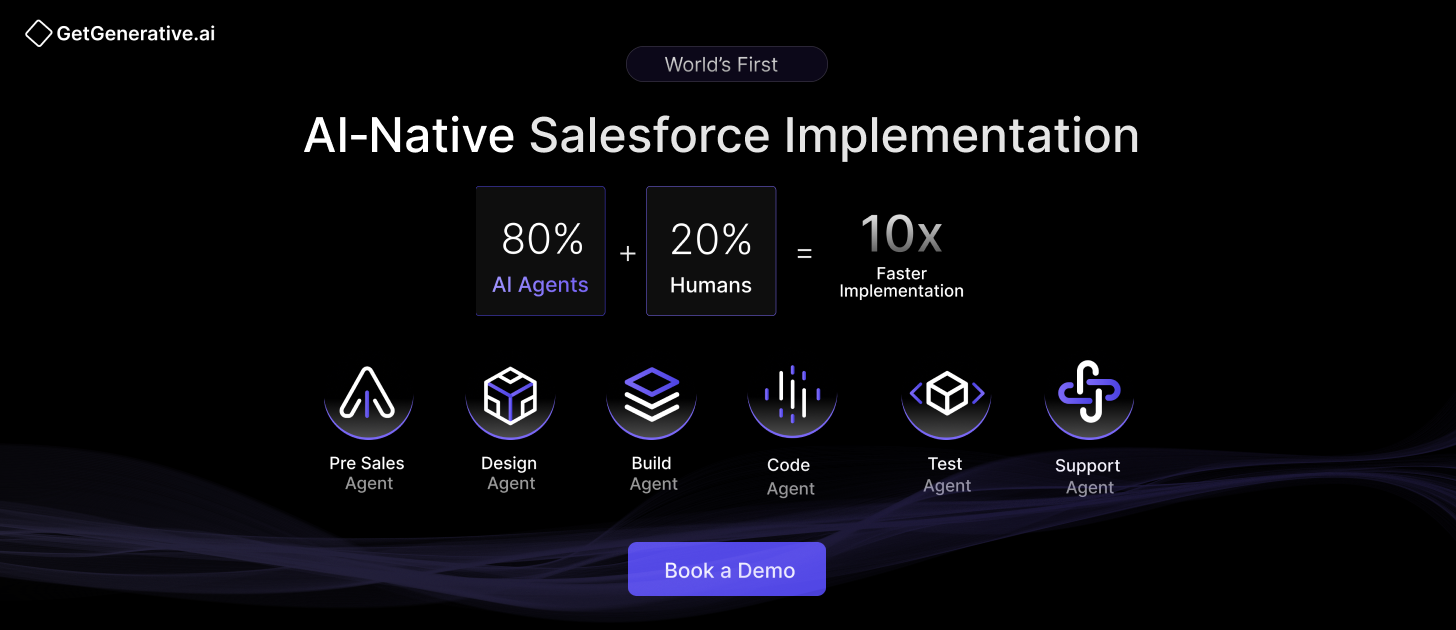Agentforce Security in Salesforce: Key Features, Use Cases, and Tips
Agentforce marks a shift from traditional automation to intelligent systems that can reason, plan, and execute complex workflows. Deploying these agents safely requires a thorough understanding of their security architecture, compliance framework, and implementation best practices.
The stakes are high. Research shows that agentic AI could generate up to $450 billion in economic value through revenue gains and cost savings in just three years. Already, 79% of organizations have adopted AI agents in some form, but trust remains a barrier; confidence in fully autonomous AI dropped from 43% to 27% last year.
This blog explores Agentforce’s security framework, real-world applications, and best practices for secure deployment. Let’s get started!
The Security Imperative in AI Agent Deployment
Understanding the Threat Landscape
Unlike traditional automation tools that follow rigid scripts, Agentforce agents can interpret natural language, access sensitive data, and autonomously impact business processes. This expanded capability creates new threat vectors that enterprises must address:
- Prompt injection attacks: Malicious inputs can manipulate agents beyond intended parameters, bypassing security and extracting sensitive data.
- Data exfiltration: Overly broad permissions may lead to exposure of customer, financial, or operational data.
- AI-enabled social engineering: Attackers can manipulate agents through conversational flows, exploiting the absence of human-in-the-loop safeguards.
These risks make it essential to implement robust automated security controls, monitoring systems, and escalation mechanisms.
Economic Impact of Security Failures
Security lapses carry steep financial and reputational costs:
- Under HIPAA, a single data breach may cost over $1.5 million in penalties.
- GDPR violations can exceed €20 million.
- In regulated industries, non-compliance can lead to suspension of operations.
Beyond fines, 95% of enterprise AI pilots fail to reach production due to unresolved security and compliance issues. Weak controls often force costly rebuilds, delaying time-to-market.
The Foundation of Agentforce Security
At the core of Agentforce’s defense is the Einstein Trust Layer, Salesforce’s native security architecture. It provides multi-layered protection to ensure agents operate safely within enterprise environments.
Comprehensive Security Architecture
- Zero data retention: No customer data is stored or used to train third-party LLMs, eliminating data persistence risks.
- Dynamic grounding with secure retrieval: Agents access only authorized data, respecting role-based access controls, field-level security, and sharing settings.
Advanced Data Protection Mechanisms
- Data masking: Detects and protects sensitive information (PII, credit cards, healthcare records) before reaching external LLMs.
- Pattern + field-based detection: Identifies sensitive data in multiple formats and languages.
- Toxicity detection: Scans prompts and responses for bias, harmful content, or malicious instructions.
While powerful, note that data masking is disabled by default to improve performance—administrators must configure it intentionally.
Also Read – Best Practices for Building Agentforce Apex Actions
Compliance Framework Integration
HIPAA Compliance for Healthcare
Agentforce supports HIPAA compliance for secure patient communications and administrative tasks:
- Automatic PHI masking during AI processing.
- Detailed audit trails for regulatory reviews.
- Escalation protocols that transfer sensitive conversations to human agents.
This ensures healthcare providers can leverage AI efficiency without compromising privacy or compliance.
GDPR and Global Privacy Standards
For European organizations, Agentforce offers:
- Full GDPR alignment with audit trails for data subject requests (access, deletion, restrictions).
- Data residency controls to keep data within geographic boundaries.
- Consent management that dynamically adjusts access based on individual preferences.
FedRAMP and Government Standards
For U.S. government agencies, Agentforce is FedRAMP High authorized on Salesforce Government Cloud Plus.
Key capabilities include:
- Advanced encryption and continuous monitoring.
- Strict data segregation for federal workflows.
- Audit logging and compliance with government standards.
Also Read – Top Agentforce Implementation Challenges & How To Avoid
Core Security Features and Capabilities
Role-Based and Attribute-Based Access Controls
Agentforce extends Salesforce’s role-based access control (RBAC) to AI agents. Agents inherit permissions of the users they represent, ensuring consistency with organizational security policies.
Additionally, attribute-based access control (ABAC) adds granularity by factoring in context like geography, time of day, or compliance status.
Administrators can configure permission sets for agents, ensuring each has only the minimum access required, reducing risk exposure.
Agent Instructions and Behavioral Controls
- Natural language instructions act as dynamic guardrails, defining acceptable behavior.
- Topic boundaries limit responses to in-scope areas.
- Supervisory LLM monitoring oversees real-time interactions, escalating risky situations to human supervisors.
Advanced Threat Detection and Response
- Real-time behavioral analysis establishes baseline patterns and flags anomalies.
- Prompt injection detection blocks or sanitizes malicious inputs.
- Integration with Salesforce Shield adds Event Monitoring and Field Audit Trail for end-to-end visibility.
Industry-Specific Use Cases and Security Considerations
Healthcare
Healthcare providers are adopting Agentforce to transform patient engagement while preserving compliance:
- Precina Health implemented AI agents for diabetes management, reducing average patient blood sugar levels from 9.6 to 6.4 in just 12 weeks.
- Security safeguards include automatic PHI masking, secure communication channels, and EHR system integration.
- Clinical decision support agents help providers analyze patient data and generate evidence-based recommendations, all under strict audit trails.
This demonstrates how healthcare organizations can balance AI-driven efficiency with HIPAA-compliant privacy protections.
Financial Services
Financial institutions use Agentforce to optimize operations and ensure compliance:
- Prudential Financial’s automated advisor follows up, saving each wholesaler half a day per week.
- Fraud detection agents monitor transactions, detect anomalies, and enforce real-time security measures.
- Secure customer support allows AI to handle routine account inquiries while escalating high-risk interactions to human advisors.
This approach strengthens fraud prevention while enhancing customer experiences in a highly regulated sector.
Manufacturing and Supply Chain
Manufacturers deploy Agentforce for supply chain optimization and quality assurance:
- Good360, a global nonprofit, uses resource-matching agents to coordinate disaster relief, cutting administrative overhead while accelerating response.
- Supply chain security agents track shipments, identify disruptions, and monitor vendor risks.
- AI-driven quality control automates inspection, defect detection, and compliance monitoring with full audit trails.
These use cases prove that AI agents can streamline manufacturing while ensuring compliance with regulatory and operational standards.
Also Read – Salesforce Dreamforce 2025: A Complete Guide
Implementation Best Practices and Strategic Recommendations
Security-First Development Methodology
Enterprises must adopt a security-by-design approach:
- Start with comprehensive risk assessments to identify vulnerabilities.
- Define agent scope clearly to avoid over-permissioning.
- Use incremental deployments to test security in controlled environments before full rollout.
This phased approach minimizes risks and builds organizational confidence in AI adoption.
Data Governance and Quality Management
High-quality, well-governed data is the foundation of secure Agentforce deployment:
- Data classification & sensitivity mapping ensure the right security controls apply to the right data.
- Regular audits eliminate outdated or risky information.
- Governance programs clarify ownership and enforce accuracy across all datasets.
These practices reduce vulnerabilities and strengthen AI agent performance.
Monitoring and Continuous Improvement
- Comprehensive audit logs track every agent action for transparency and compliance.
- KPIs and performance metrics (e.g., prompt rejection rates, unauthorized attempts) measure security effectiveness.
- Regular security assessments — including penetration tests and vulnerability scans — help identify emerging risks.
Continuous monitoring ensures AI systems evolve securely alongside business needs.
Organizational Change Management
Successful deployment requires cultural readiness:
- Cross-functional collaboration between IT, compliance, business, and security teams.
- Training programs to educate employees on safe prompt use and incident reporting.
- Feedback loops to refine agent behavior and enhance controls in real-world scenarios.
This people-first strategy ensures technology adoption aligns with organizational resilience.
Conclusion
With 96% of enterprises planning to expand their use of AI agents in the next 12 months and 62% projecting ROI above 100%, Agentforce represents a major opportunity. But seizing it requires more than enthusiasm — it requires security leadership.
At GetGenerative.ai, we’ve reimagined Salesforce implementation—built from the ground up with AI at the core. This isn’t legacy delivery with AI added on. It’s a faster, smarter, AI-native approach powered by our proprietary platform.
👉 Explore our Salesforce AI consulting services




